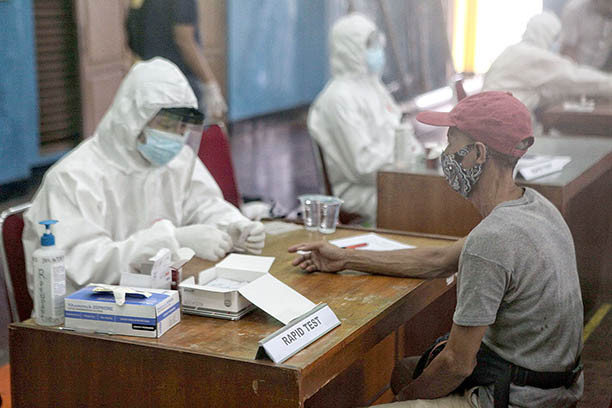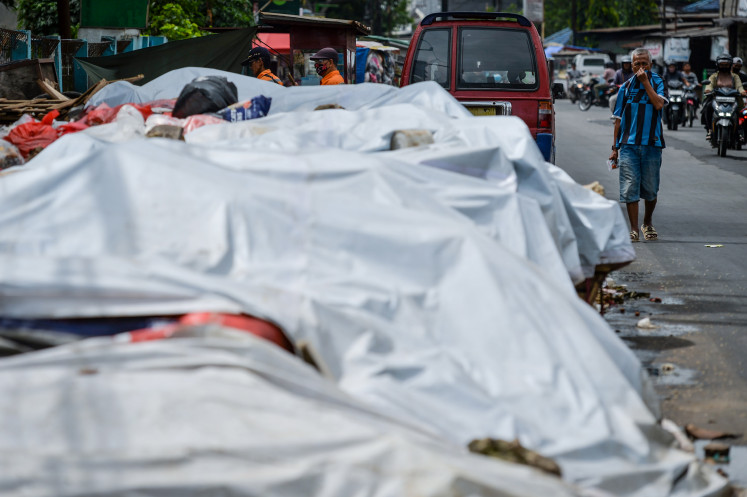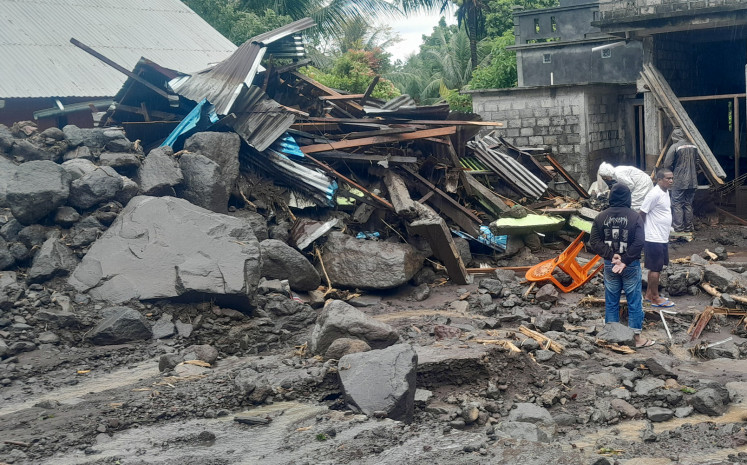Popular Reads
Top Results
Can't find what you're looking for?
View all search resultsPopular Reads
Top Results
Can't find what you're looking for?
View all search resultsWorld Bank revises down Indonesia’s GDP forecast
Change text size
Gift Premium Articles
to Anyone
T
he World Bank has stressed the importance of public health measures to fight the COVID-19 pandemic and government support for households and businesses as it slashes Indonesia’s economic projection for this year.
The multilateral lender based in Washington, DC, said in its latest Indonesia Economic Prospects report published on Thursday that the country’s improved testing and contact tracing capacity were essential in efforts to reopen the economy. The government also needs to maintain its social assistance and liquidity support, according to the report, because without the aid, 8.5 million people may fall into poverty this year.
“There are reasons to be hopeful for the future, but the road to full recovery is likely to be long and challenging,” World Bank country director Satu Kahkonen said in a virtual press conference on Thursday.
“Strong and well-implemented public health and economic policies are the keys in accelerating and strengthening the recovery.”
The World Bank now expects Indonesia’s gross domestic product (GDP) to shrink by 2.2 percent this year, which compares to a less severe contraction of 1.6 percent projected in the World Bank’s September report on Indonesia, because of a weaker-than-expected recovery in the third quarter.
Indonesia recorded a 3.5 percent year-on-year GDP contraction in the July–September period, sending the country into its first recession since the 1998 Asian financial crisis, as the coronavirus outbreak paralyzed economic activity. The contraction is less severe than the 5.3 percent decline seen in the second quarter.
The World Bank joins the Asian Development Bank in downgrading Indonesia’s economic prospects. The ADB forecast on Dec. 10 that Indonesia’s economy will shrink 2.2 percent this year, as opposed to a contraction of 1 percent projected earlier, citing a continued slowdown in economic activity.
Indonesia is expected to see growth rates below the 2019 level at least until 2022, according to the World Bank’s report. Growth is projected to rebound to 4.4 percent next year and 4.8 percent in 2022.
“This is subject to the assumption that the pandemic is contained, structural reforms are implemented and help mitigate the effects of the crisis,” said World Bank acting lead economist Ralph van Doorn.
If Indonesia sees a new surge of coronavirus cases and some tightening of mobility restrictions, this can lead to lower growth of 3.1 percent next year and 3.8 percent in 2022, according to the bank.
“So, it is important for the government to [maintain] public confidence and really think carefully about how to roll out the vaccine, but also to understand that the vaccine is not the silver bullet,” said van Doorn.
The report also recommends that Indonesia focus on securing and accelerating the recovery by developing well prioritized tax and expenditure reforms to help finance the crisis response, reduce financing needs and improve fiscal space. It also advises the government to advance structural reforms to boost investment, productivity and human capital.
Both Kahkonen and van Doorn are of the view that personal hygiene, physical distancing, wearing masks, contact tracing and testing will remain critical amid the vaccine rollout.
Earlier this month, the government imported 1.2 million doses of COVID-19 vaccine from Beijing-based biopharmaceutical company Sinovac Biotech. It has allocated Rp 35.1 trillion (US$2.49 billion) for the vaccine procurement and inoculation program, which will be free of charge, as part of the Rp 695.2 trillion COVID-19 relief package. It also plans to redirect some of the package’s unabsorbed funds toward the mass vaccination drive.
The World Bank lauded Bank Indonesia’s (BI) role in responding to the pandemic-induced slump through the purchase of government bonds to provide liquidity for the financial market.
The central bank’s purchases of local currency government bonds worth of around 1.8 percent of Indonesia’s GDP in August, slightly above the 1.7 percent average among emerging markets, has helped maintain financial stability and finance the fiscal deficit, the report reads.
BI has cut its benchmark interest rate five times this year to 3.75 percent, the lowest since the policy rate was introduced in 2016, and introduced several macroprudential policies to help boost the cooling economy.
“We will continue our policy of low interest rates until we see some emergence of inflationary pressure,” said Bank Indonesia Governor Perry Warjiyo at the same event.
Inflation was recorded at 1.6 percent yoy in November, nearly half of the rate seen a year earlier. The World Bank forecast inflation to stand at 2 percent this year, in line with the central bank’s lower-end target.










